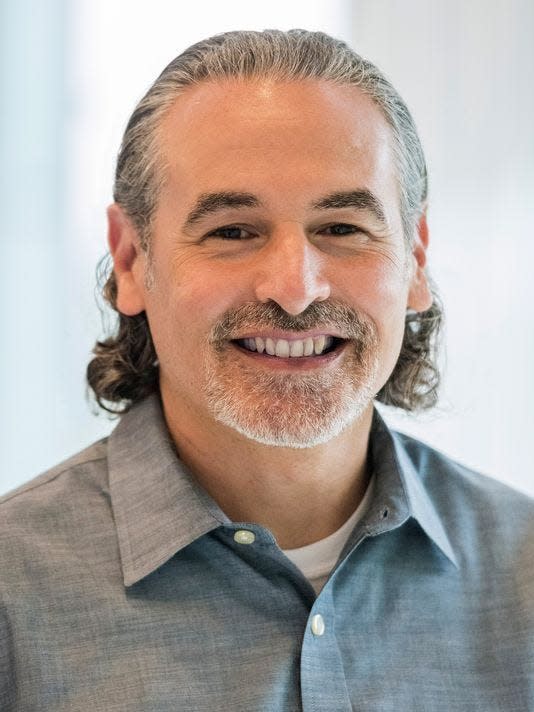From the editor: Let's get out of our echo chambers. Our democracy depends on it
What’s the biggest threat to our democracy?
It’s a provocative question, one that frankly I wasn’t expecting to field when I was speaking via Zoom to members of a local club called Bold New Democracy.
“We work as political activists to build a bold new democracy that is passionate, progressive and powered by people,” is Bold New Democracy’s statement of purpose. Through its website and email newsletters, members share viewpoints in line with that mission. Among recent postings is an open letter to me that’s critical of an Associated Press story we published last May about former President Donald Trump’s meeting with the leader of a national anti-abortion organization. “Where should we begin with what is wrong with this picture?” the letter asks.
Dan Shatzer, the organizing force behind Bold New Democracy and author of that letter, invited me to speak about The Enquirer’s code of ethics and how it aligns with supporting democracy. I jumped at the opportunity. It’s a passion topic for me, one that I’ve written about and touch on when I'm asked to speak to groups around town.
I emphasized that we focus on local issues and rely on the Associated Press and our company’s flagship, USA TODAY, for national coverage. I then tackled the topic of bias.
“Let’s get one thing out in the open,” I said, launching into one of my schticks when speaking to groups. “I’m biased. Everyone who works in journalism is biased. If they say they aren’t, they’re lying.
“What makes us professional journalists is that we acknowledge that bias and actively work to mitigate it through balanced reporting that above all seeks the truth and by adhering to our code of ethics.”
What’s in that code that pertains to politics? As journalists, we of course are encouraged to exercise our right to vote. But we abstain from participating in campaigns, publicly expressing support for candidates (no yard signs or social media endorsements) or running for election. Our role is to be observers.
Read more: We're unapologetic skeptics, especially during election season | A note from the editor
To stay an arm’s length from partisan politics, I take the extra step of not voting in primary elections. The only exception is when there is a local referendum, and, in that case, I request an issues-only ballot.
The bulk of my time with the group was spent fielding questions, something I enjoy and learn a great deal from. That’s when the question was posed about the biggest threat facing our democracy. After my talk, one of the Bold New Democracy members sent me an email suggesting I share my response in a future column – so here it goes.
Certainly, the Jan. 6 attack on the United States Capitol in 2021 – our toxic polarization as a country on full display – comes to mind. Woven into that dark day is the eroding trust in our country’s institutions, our elected leaders and the integrity of our elections.
But from my perspective as a career journalist, what keeps me up at night the disconcerting loss of media literacy in our society and the blurring line between opinion-driven content and fact-based journalism. How did we get here?
You can trace the start to cable news and the 24-hour news cycle. Opinion and commentary make up the bulk of what you watch now, and too many of us accept what we hear as fact without seeking viewpoints from the other side.
The digital revolution and the rise of social media came next, replacing legacy news sources with search engines and wide-open platforms susceptible to propaganda and outright misinformation as the primary channels for news and information.
I shared that our research on the media habits of digital natives – people who don’t know a life without the internet – shows that fewer and fewer of us actively seek news and information from a trusted source. “If something is important, it will show up on my feed,” is a common response to the question, “Where do you get your news?”
Not wanting to sound alarmist, I tossed in this lesson from history: When democracies fall, it usually means someone has taken control of the armed forces, followed by the press.
So what can we do about declining media literacy? That’s the topic for a future column, perhaps, but I’ll start with an obvious first step: Let’s get out of our echo chambers.
Social media and search engines, by design, feed us exactly what we want to consume. It’s confirmation bias to the nth degree.
Take the time to actively seek information on complex topics from reliable news sources, ones that have a code of ethics and strive to live by it.
The Enquirer prides itself on being one of those sources. And even though we’re not perfect, we’re always willing to listen and learn. It’s important to me that we’re transparent and accountable to the readers we serve.
And as I hope I proved to the kind folks at Bold New Democracy, no question is off limits.
Enquirer Executive Editor Beryl Love writes a biweekly column that takes you behind the scenes at The Enquirer. Occasionally, he shares his thoughts on local issues, particularly as they pertain to a free press and open government. Email him at blove@enquirer.com. He can’t respond personally to every email, but he reads them all.

This article originally appeared on Cincinnati Enquirer: Enquirer editor Beryl Love column on threats to democracy
